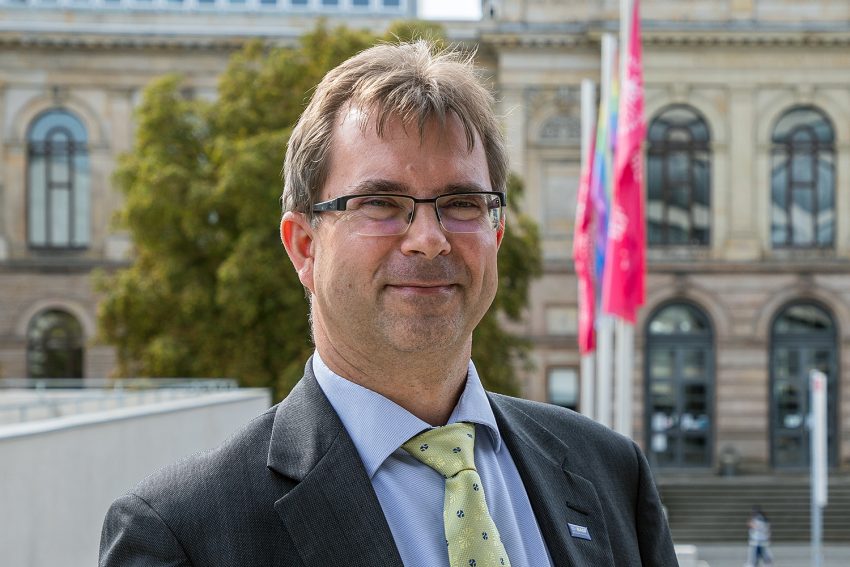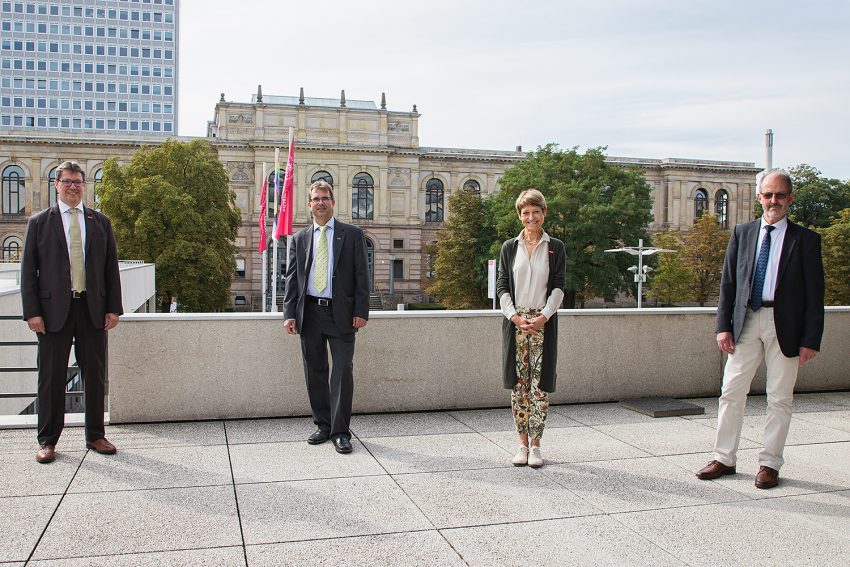Dr. Kai Exner becomes honorary professor at TU Braunschweig Appreciation for teaching excellence
Dr. Kai Exner was appointed honorary professor of the Faculty of Electrical Engineering, Information Technology, Physics on 7 September 2021. In doing so, the faculty is honouring his many years of teaching at Technische Universität Braunschweig. In his lecture “Design of Experiments”, he teaches students a more economical alternative to classical experiment design – with a steadily growing audience.

New honorary professor of the Faculty of Electrical Engineering, Information Technology, Physics: Dr. Kai Exner. Photo credit: Max Fuhrmann/TU Braunschweig
Exner came into contact with TU Braunschweig more than ten years ago: As an industrial representative at the Innovation Lab in Heidelberg, he held a seminar on statistics and design of experiments for the research groups represented at the suggestion of Professor Wolfgang Kowalsky from the Institute for High-Frequency Technology at TU Braunschweig. The highlight: instead of a final exam, the participants were given an interactive, web-based challenge at the end. They applied the techniques they had learned for the design of experiments to optimise an unknown system.
The great response to the seminar prompted Kowalsky to persuade Exner immediately afterwards to offer the seminar in the form of a regular lecture, also held in English if required: “Statistics, Design of Experiments & Optimization”. Since then, the lecture can look back on four years of growing attendance. In the meantime, more and more interested students from other faculties, such as the Faculty of Architecture, Civil Engineering and Environmental Sciences, are attending. In addition to lecturing, Exner regularly supports Master’s thesis and doctoral dissertations wherever questions of experimental design and statistics arise.
What is “Design of Experiments”?
The classical approach for scientific experiments is to change only one factor at a time in order to precisely capture the influence of the factor on the experimental result. However, in processes and systems that depend on several factors, this approach is not economical if you want to describe and optimise a system. In addition, there are often interactions between the factors that are not captured by this approach. “Design of Experiments” now combines statistical methods with the optimal planning of experiments to allow a system description and optimisation with the highest possible efficiency. Thanks to the statistical basis, the influence of the ever-present “noise” (experimental fluctuations) is neatly separated from real effects, so that researchers do not fall for bogus effects whose supposed exploration wastes time and other resources.

Professor Eduard Jorswieck, Honorary Professor Dr. Kai Exner, TU President Professor Angela Ittel and Professor Wolfgang Kowalsky. Photo credit: Max Fuhrmann/TU Braunschweig
About the person
Dr. Kai Exner discovered his fascination for Chemistry early on: Already in 1988, he took part in the Chemistry Olympiad in Finland and subsequently founded, together with many like-minded people, the Förderverein Chemie-Olympiade e.V. For almost 30 years, the association has supported the German selection procedure of the school competition funded by the BMBF and thus inspired young people for Chemistry.
Exner’s academic career began with Chemistry studies at the Albert Ludwigs University of Freiburg, where he completed his doctorate in Organic and Physical-Organic Chemistry under Professor Prinzbach in 1998. After his doctorate, a postdoctoral stay followed with Professor Paul von Ragué-Schleyer at the University of Georgia, USA. There he mainly researched the application of quantum chemical calculations to (extreme) bonding forms in Chemistry.
After post-doctoral work, Exner joined BASF in November 2000, initially working in Process Development and setting up a research laboratory in Mumbai, India. From research, he moved to New Business Development in 2008, first to Life Sciences Intermediates and then to Organic and Printed Electronics in 2010. At this point, contacts with TU Braunschweig began through publicly funded research projects at the Innovation Lab in Heidelberg.
Scientific interests
Exner’s ancestral interests in Chemistry lie in the fields of Physical-Organic Chemistry, especially Photochemistry, (Radical) Ions, (Extreme) Forms of Chemical Bonding. His interest in statistical methods was aroused by his work in industry. It includes on the one hand the description, i.e. modelling, and on the other hand the optimisation of multi-parameter systems, both in an industrial context from the point of view of both production and quality control.
